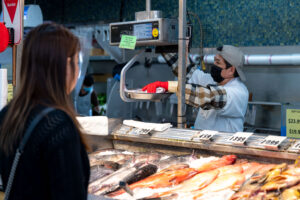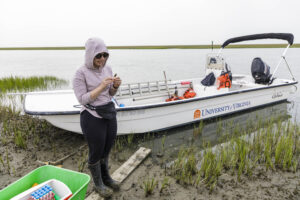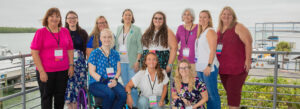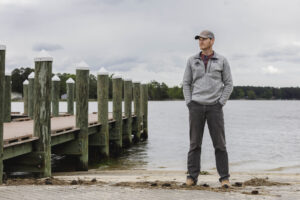Knauss Fellow’s on-the-ground experience in Alaska guides marine policy
Millions of people visit Alaska every year to enjoy its scenic landscape and wildlife. But, Knauss Fellow Jim DelBene was visiting as a member of Senator Lisa Murkowski’s office—part of his yearlong experience working on marine policy in the United States Senate.
Over the course of the visit, DelBene met with officials from the Port of Alaska in Anchorage, rescue swimmers at the United States Coast Guard Base Kodiak, commercial fishers in Cook Inlet, members of the mariculture industry, and organizations working to reduce marine debris.
“You can visit a place on vacation, but it’s not the same as going as staff of an elected official, where you’re meeting with constituents and learning about their work, their needs, and the challenges they face,” DelBene said. “You bring back those on-the-ground experiences to the D.C. office, where you work on legislative actions to address these issues for Alaskans and the nation.”
As a fellow focused on ocean and coastal issues, DelBene tracked legislation related to Alaska’s priorities like commercial, recreational, and subsistence fisheries and climate change impacts on small, rural coastal communities. DelBene kept tabs on relevant bills and regularly met with constituent and stakeholder groups to inform the senator’s priorities. Since Sen. Murkowski sits on the Senate Committee on Appropriations, DelBene used these meetings to help organize the senator’s funding priorities for ocean-related issues in the fiscal year 2021 appropriations bills.
“A law may authorize a new program or initiative, but until money is actually appropriated, there aren’t funds available to support it,” he said.
In 2020, NOAA cancelled many fishery surveys across the country due to the pandemic. Alaskans paid close attention to these cancellations, since the data collected from fishery surveys are essential to sustainably manage Alaska’s fisheries, which are responsible for more than 60 percent of the seafood harvested in the United States. DelBene tracked survey cancellations and regularly corresponded with NOAA to stress the importance of all surveys.
To ensure NOAA executed surveys in 2021, he spearheaded Sen. Murkowski’s work on a bipartisan letter with 18 cosigners, requesting that NOAA produce a written plan for safely completing 2021 surveys.
“That was a big concern for the Alaska delegation and all Alaskans that rely on Alaska’s fisheries as a food source and for jobs to support their families,” DelBene said.
He also led outreach to other senators and interest groups to increase support for the Sen. Murkowski’s Blue Carbon for Our Planet Act. This bill would improve the nation’s understanding of blue carbon ecosystems—like wetlands, seagrass beds, and mangroves—and coordinate national efforts to protect and restore the valuable services they provide, such as carbon sequestration and storm protection.
As a fellow focused on ocean and coastal issues, DelBene tracked legislation related to Alaska’s priorities.
Ocean and coastal issues often overlapped with other portfolios in Sen. Murkowski’s office—whether addressing issues with work visas for the seafood industry or conflicts with international vessel traffic near the Arctic. During his time in the office, DelBene also worked closely with staff on the Senate Committee on Energy and Natural Resources, which Sen. Murkowski chaired.
As part of the fellowship, he wrote memos to keep the senator up-to-date on situations in Alaska, brief the senator before meetings, and prepare the senator for speeches. This required him to closely follow current events both on the Hill and back in Alaska, gathering information from news outlets and through conversations with constituents and colleagues on the Hill.
“Lots of what I learned in graduate school for communicating science came in handy for memo writing, especially for drafting speeches. When you’re writing speeches, you’re thinking about who the audience is, what current events are relevant, and what the audience actually cares about,” DelBene said. “It was always important to share federal policy updates with the audience, infusing science to provide context and reasoning for such policy actions.”
DelBene plans to continue working in science policy after the fellowship.
Photos contributed by Jim Delbene
Video by Aileen Devlin | Virginia Sea Grant
Published April 30, 2021.
“You can visit a place on vacation, but it’s not the same as going as staff of an elected official, where you’re meeting with constituents and learning about their work, their needs, and the challenges they face,” DelBene said.






